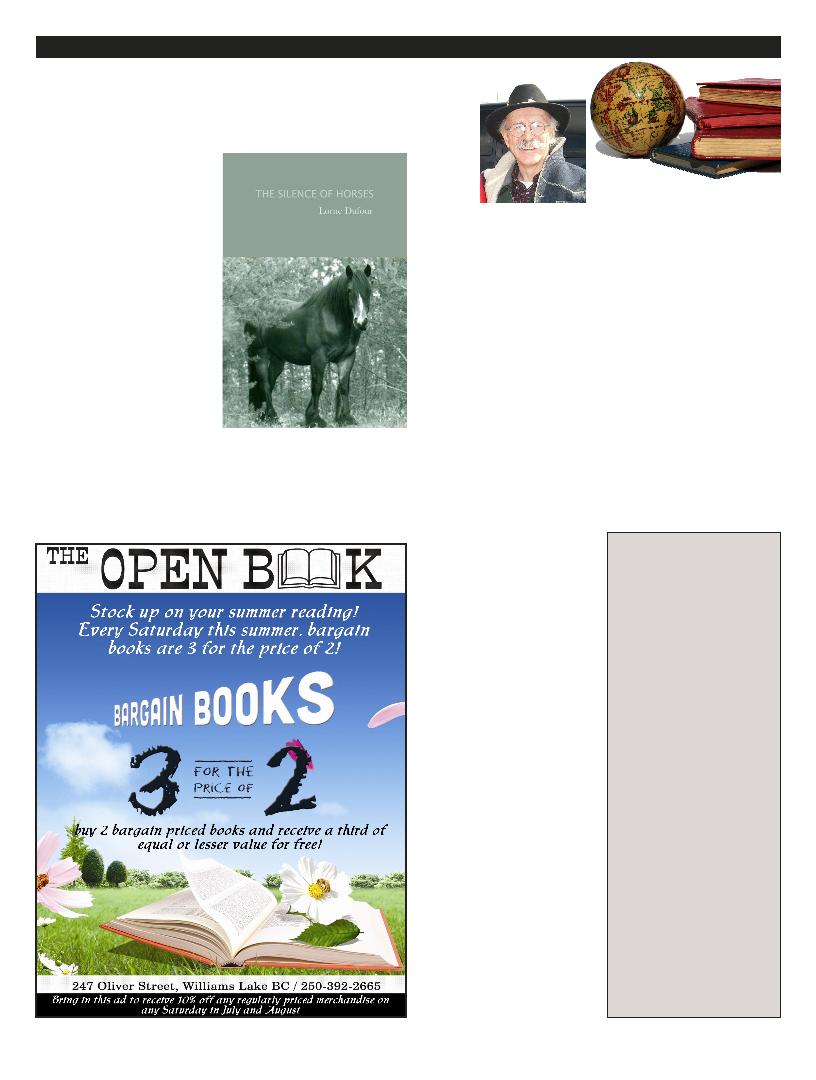
produced a new book of
verse called The Silence of
Press.
at the Gecko Tree Restaurant, and was joined
on stage by some musician friends to help
him celebrate. If you missed that perform-
ance you can catch "Lornie," as his friends
call him, on the Hootstock Music Festival
stage in Forest Grove on July 27.
words. Lornie has developed his craft for
over 50 years, and he's getting better at it.
he had to learn vocabulary and to speak all
over again. Most of the poems in The Silence
of Horses were written after his aneurism.
ber were some verses of John Donne. I was
told I might not be able to write again."
brand new perspective.
people how great it is to be alive."
do you express the essence of what really
matters?
paints the Cariboo from a mystic's perspec-
steam rises from the gigantic bodies
the team stands breathing rapidly
their flanks pumping air into their lungs
the teamster squats down near their
heads
talking quietly to them
nearby a ladder-backed woodpecker
thumps away at a dry cedar
and you can almost hear the snow fly
as a red squirrel scurries down
the length of a windfall
occasionally a frozen fir booms
like a rifle shot and slowly the sound
of the horses' breathing subsides
until a sort of ocean-bottom silence
asserts itself mysteriously smoke-like
through the trees
from far below on the shoulder
of the mountain the clanking, grinding,
rumbling sounds of cats and skidders
get tangled up in a breeze and come
battering and ramming themselves
through the fir trees
the horses turn their ears towards
the source of the invading sound
the squirrel hesitates in his business
and the man turns his head and spits
in the direction of the sacrilege
then turns back to the horses
and continues to speak quietly to them
way you can smell the horse sweat running
down the sides of his beloved behemoth gi-
ants dragging logs from the bush.
own aging. "My body has become a personal
type of disgust," he writes. "Now after seven
decades of delight, I now find it repulsive."
mate visiting the loggers at lunch. Of course
he writes plenty about horses. "Horse log-
ging," he says. "Don't forget to mention I
was a horse logger for 35 years."
and their three kids Creole, Tereina, and
Easton, notwithstanding. It is through his big
Clydesdales that he touches the brass ring of
life's deeper meaning. His horses are his
metaphor for what really matters.
and holds them up for us to admire. He wings
you into the cadence of a great flock of Can-
ada geese passing overhead. You can hear
their cries, he says, but they are so high they
are hidden from view. Then he ponders
whether they can see him and want him to
hear their songs. Ah, the mind of a poet.
Where some might buy an expensive gift or
gadget, Lornie will compose and dedicate a
special verse. These are items of thought and
feeling, truly an honour to receive. "The
Wedding for Troy and Ingrid" on page 50 of
The Silence of Horses is an example.
brate in the skies of our hearts," he writes.
In December, 2004, Lornie and I became
good friends. We knew of each other before
that, but hadn't really connected. We ran into
each other at a memorial service for Jerry
LeBourdais in Lone Butte, and we both con-
cocted some writing to commemorate our old
revolutionary comrade.
published in Van Andruss's Lived Experience
this annual literary journal from the moun-
tains of British Columbia.
periences like the steam rising off a hot cup
of coffee on a cold day. Inspired by Irish poet
W.B. Yeats, he portrays his meaning in un-
complicated language.
to have a poet of Lornie's calibre in our
midst. Everyone should own a copy of at least
one of his books, if not all four. He published
Spit on Wishes (1983), Starting from Promise
(2001), and Jacob's Prayer (Caitlin Press
2009).
used on the cover of The Silence of Horses.
ing member of the herd of horses he bred
and raised at McLeese Lake with his origi-
nal stallion and mare.
him 400 poems and he whittled it down to
140," Lornie says. "My poems kind of
sneak up on you."
Sage Birchwater is a 40-year resident of
the Cariboo Chilcotin. After spending 24
years "out west" in the Chilcotin living
on a trapline and launching his writing
career, Sage moved to Williams Lake. He
worked at the Williams Lake Tribune for
years and now focuses on authoring
books and freelance writing. He has writ-
ten and edited several books and pub-
lished his work in various magazines,
literary journals, and newspapers. Sage
is currently working on a memoir with
Corky and Jeanine Williams slated to
come out this fall with Caitlin Press